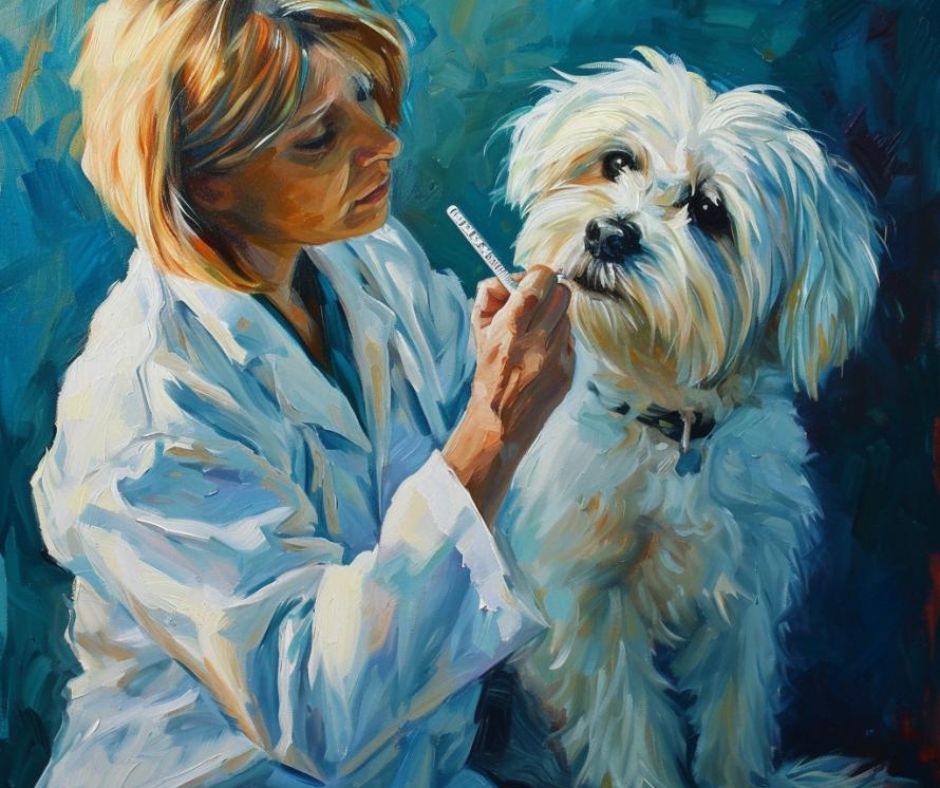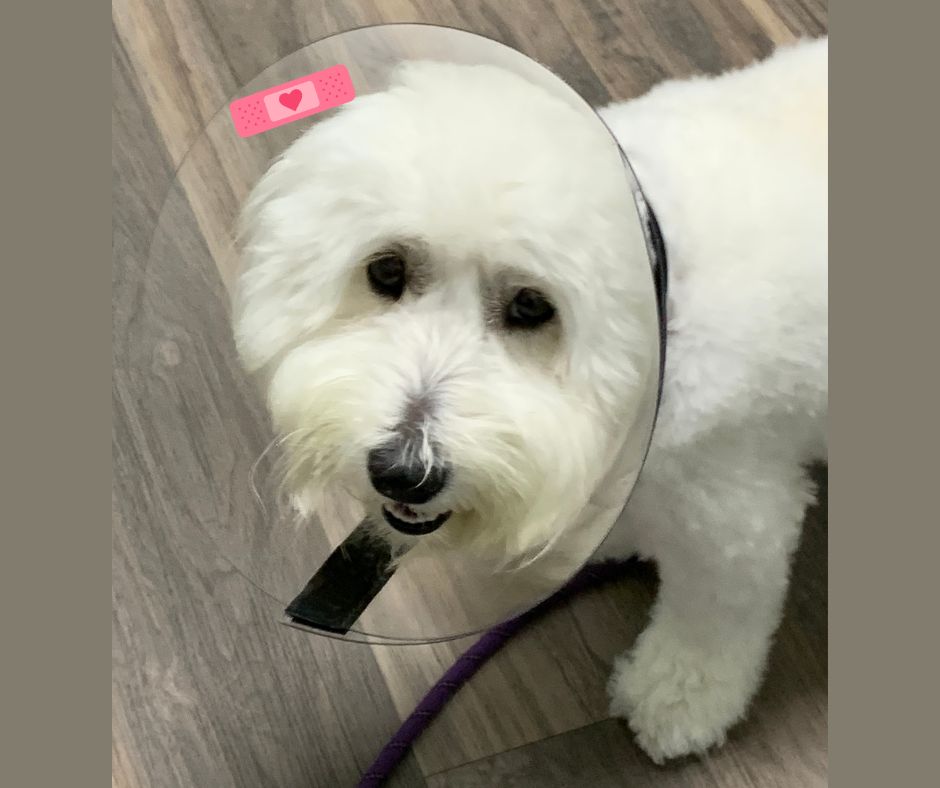Common Coton de Tulear Health Issues and Prevention Tips
While the Coton is a generally healthy breed with a long lifespan (14 - 17 years), if you are considering adding this adorable rare breed to your family, it's important to be aware of potential common Coton de Tulear health issues.

By understanding these health issues, you can take steps to prevent or manage them and ensure that your dog stays happy and healthy.
Common Genetic Coton de Tulear Health Issues
Some health conditions may be hereditary and can be passed down through their genes. That's why it's super important to find a breeder who does genetic testing to nip any inherited problems in the bud.
Here are 8 of the most common genetic health issues that can affect Coton de Tulear dogs:
#1 - Luxating Patellas are one of the most common health issues in Cotons. It occurs when the kneecap slips out of place, which causes pain and discomfort. Medical management through weight control, pain management, and anti-inflammatory medication is usually prescribed for mild cases. In severe cases, surgery may be necessary to correct the position of the patella and stabilize the knee joint.
#2 - Hip Dysplasia is a genetic disease that affects the hip joint and hind legs and is most commonly diagnosed using X-rays. It's caused by a malformation of the ball and socket joint, which can lead to arthritis and lameness.
Instances of hip dysplasia are relatively low for the Coton due to responsible breeding practices. In addition to genetics, this condition can also result from added weight putting pressure on the dog's joints. Losing weight often reduces symptoms, but surgery may be required for more severe cases.
#3 - Skin Problems and Allergies: Cotons de Tulear are prone to skin allergies, which can cause itching, redness, and discomfort. Environmental factors such as pollen, dust, and mold can trigger allergies in some dogs.
In other cases, food allergies or sensitivities can cause skin problems. My Coton, Luc, had severe skin allergies - he was allergic to several environmental allergens and also had food allergies. He was even allergic to my cat!
It was frustrating and heartbreaking because there was no quick and easy way to determine the cause of his discomfort. And when we did finally find the reasons, it took years of trial and error to discover the proper treatment for him. You can learn more about dog skin allergies here.
#4 - Ear Infections: Long-eared dogs like the Coton are prone to ear infections caused by allergies, moisture in the ear, hormonal imbalances, or foreign bodies.
Treatment for ear infections typically involves a combination of antibiotics or antifungal medication to clear the infection and anti-inflammatory medication to reduce swelling and pain. Routine cleaning and keeping the ears dry, especially after grooming, can help prevent infections.
#5 - Dental Issues: Cotons may face dental issues such as tooth decay and gum disease. Regular dental check-ups and proper dental hygiene can help prevent dental problems. Learn how to keep your dog’s teeth clean here.
#6 - Progressive Retinal Atrophy (PRA) is a genetic disorder that causes the gradual degeneration of the retina that can lead to vision loss and eventual blindness. Unfortunately, there is no cure or treatment available to slow down the disease's progression.
Dogs that carry the gene for PRA should not be bred. But dogs are resilient, and supportive care, such as home adaptations and special training, can help improve the quality of life for dogs with PRA.
#7 - Canine Multifocal Retinopathy (CMR) is another genetic disease that affects the retina. CMR causes small lesions to form on the retina, which can lead to vision loss. While not all dogs with CMR have vision loss or show signs of the disease, it can be detected through genetic testing. Dogs that carry the gene for CMR should not be bred.
# 8 - Primary Hyperoxaluria (PH) is a genetic disease that affects the liver and kidneys. Dogs with PH produce too much oxalate, which can lead to the formation of kidney stones and kidney failure. According to the ACC, signs of the disease start to show up as early as 3-4 weeks old and will eventually result in kidney failure. In some dogs, managing the disease through dietary changes and medication is possible. Dogs with PH should not be bred.
In addition to these Coton de Tulear breed genetic issues, other health challenges are also possible for all small dogs regardless of breed. These challenges include obesity, tracheal collapse, arthritis, hypoglycemia, broken bones, disc disease, and heart disease.

Top 3 Secrets for a Vibrant and Healthy Coton de Tulear
Just because the Coton is more prone to specific genetic diseases doesn't mean it's a foregone conclusion. There are things you can do to lower the odds of these health problems cropping up.
It's a bit like our own health, isn't it? If heart disease runs in your family, it doesn't mean you're destined to face the same fate. By making healthy choices, you can outsmart your genes.
The same goes for your Coton. You're not just at the mercy of genetics; there are proactive steps you can take to help ensure your dog leads a healthier, happier life. It's all about turning those possibilities into opportunities for wellness.
Genetics are a possibility, not a certainty.
No.1 - Provide daily care and maintenance: Cotons de Tulear require daily care and maintenance to keep them healthy and happy. This includes grooming, dietary needs, and physical and mental activities. Here are some tips to keep your Coton in good condition.
- Grooming: Cotons have a long, fluffy, cotton-like coat requiring special attention. If left in the standard long hair, daily brushing is a must! But grooming isn't just to make our dogs look beautiful. It can prevent ear infections and dental problems and allow for early detection of skin issues such as rashes, infections, or more serious lumps that need attention. Grooming can also strengthen the bond between you and your dog, which helps promote trust and an overall sense of well-being.
- Dietary Needs: Cotons require high-quality dog food to maintain their health. Look for dog food that balances protein, carbohydrates, and fats. Avoid feeding them low-quality table scraps, as it can upset their stomach and cause weight gain.
- Exercise Needs: Coton de Tulear dogs are active dogs and require regular exercise and activity. Take them for daily walks or playtime in a fenced yard. They also enjoy playing fetch and other games that involve physical activity. Don't forget to exercise their minds - mental stimulation is just as important as physical exercise.

No.2 - Behavior Modification: Cotons are known for being intelligent, friendly, affectionate, and playful dogs. However, like any breed, they can develop certain behavioral issues if not properly trained and socialized. Two important behavioral traits to consider when owning a Coton de Tulear are separation anxiety and socialization.
- Separation Anxiety: Cotons are companion dogs who are prone to separation anxiety, which is a condition that causes dogs to become anxious and distressed when left alone. This can result in destructive behavior, excessive barking, and even self-harm. To prevent separation anxiety, start training your Coton early on and gradually increase the amount of time they spend alone. Providing your dog with a safe space, such as a crate or designated room, can also help them feel more secure when left alone.
- Socialization: Early socialization is crucial for Cotons. They are friendly dogs and enjoy spending time with family members, but they can be wary of new people and situations. Exposing your Coton de Tulear to a variety of people, places, and experiences at an early age can help them develop into a well-rounded and confident dog.
- Proper training: In addition to socialization, training is also essential for your puppy's development, as it helps establish a bond between you and your puppy and teaches them how to be a well-adjusted member of your family. It's not just about teaching them cool tricks or obedience commands – it's the key to building an incredible bond with your little pup. Imagine guiding your Coton to understand what's expected, turning stressful situations into calm ones, and avoiding scary mishaps like dashing into traffic. Training is also a great way to give their brains and bodies a workout, boosting their overall health and happiness.
No. 3 - Breeding and Puppy Care: Your dog's genetics and early puppy care are the beginning of their health journey and can lay the foundation for their entire life. These early factors play a huge role in shaping their journey into adulthood:
- Choosing a Reputable Breeder: When looking for a Coton de Tulear puppy, the key is to connect with a reputable breeder who knows the breed inside and out. A good breeder will prioritize the health and well-being of their dogs and will be knowledgeable about the breed standards and genetics.
A great place to start your search for reputable breeders is with a national breed club. You can find a list of Coton de Tulear clubs here. Members of these clubs follow strict ethics codes, which means they're committed to responsible breeding practices that their members must follow.
When visiting a breeder, ask to see the puppy's parents and their health records. This is a sneak peek into your puppy's future health and personality. Responsible breeders don't just hand over a new puppy; they'll be your go-to guide for everything you need to know about the breed. This relationship often lasts throughout the entire life of your dog.
While choosing a reputable breeder is critical to reducing genetic traits in the breed, it's not always enough. Despite my dog, Lucy, coming from a reputable breeder who did everything she could to ensure the health of the puppies, she still has serious health challenges, such as liver disease and epilepsy. Sometimes, dogs just get sick. My previous Coton, Luc, came from a breeder with fewer credentials, and he was primarily healthy with some chronic allergies.
- Puppy Care & Development: Your puppy will likely be with a breeder for the first 8 to 10 weeks of its life, so they must ensure the puppies get the physical and mental development they require in these critical early days. They are responsible for more than just providing vet care, safety, and nutrition.
Breeders must socialize the puppies as early as possible, groom them, play with them, and monitor their development. Good breeders will keep you in the loop with their development and send photos and videos if you cannot visit in person.
And when they pass the baton to you, you must continue providing a high-quality diet, training, exercise, socialization, and lots of play and love.

One of the things I've learned from having a dog with health challenges is that you have to be prepared for this responsibility when you decide to bring a puppy home.
There are things you can do to mitigate potential health concerns, as discussed above, and you can prepare financially by getting pet insurance, but the main thing you can do is love your dog in sickness and in health. My sweet Lucy has taught me so much about unconditional love. What a gift she is!
Learn more about Coton de Tulear health issues,(and much more) in Meet the Cotons: Everything You Need to Know About Living with and Loving the Wonderful and Quirky Coton de Tulear.
Home | About Me | Contact Me | Privacy Policy |Disclosure
Copyright© 2008- All Rights Reserved









